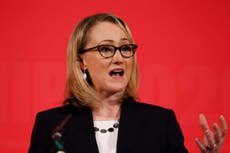The climate crisis needs a new industrial revolution – but it doesn’t have to be on this planet
Boris Johnson has made encouraging noises, but now is the time for action. Analysis indicates that the sector holds the key to creating 15,000 high-value jobs, spreading much-needed growth across the UK
As the climate crisis threatens the earth’s ecosystems, look out for the new breed of UK-based data scientists dedicated to dealing with floods, wildfires and other cataclysmic events. The ever-increasing accuracy of satellite imagery means that emergency services and fire response teams are already capable of deploying at a faster rate than ever before. Within the next decade the various technologies will be developed further and there could be numerous job opportunities in the field of real-time natural disaster hotspot monitoring.
In the UK’s booming sustainable financial sector, there will be quantitative analysts measuring the impact of particular investments on the natural environment. Armed with geospatial data, including earth observation and climate data, they will provide investors with the information needed to better judge how they can allocate capital sustainably. In the agricultural sector, space-data-enabled crop managers and agricultural satellite advisers will be helping to realise more sustainable, efficient and cost-effective methods of farming.
Welcome to the near future, if the UK space industry keeps on growing in size and advancing in the global space market. As the world wakes up to the devastating impact of the climate emergency, the UK has already taken a lead in committing to reach net-zero carbon emissions by 2050. And by properly investing in our space industry, we could soon assume the position of world leader in action as well as words.
In many respects, the space sector is the unsung hero of attempts to get to grips with the climate crisis. Space-based technologies and space-derived information are central to climate knowledge, science, monitoring and early warning. Indeed, 35 of the 45 essential climate variables defined by the heads of UN Climate Change are measured from space. In the future, new applications of satellite data, combined with satellite positioning and communications technologies will help drive down carbon emissions as well as providing key capabilities required to manage the devastating effects of the climate emergency to communities up and down the country and around the world.
In a decade's time, with the right investment, we could have a new industrial revolution here in the UK with green jobs spread across all our regions. Our new analysis suggests that the space sector holds the key to 15,000 green jobs being created in the UK by 2030. These new posts would be some of the highest value in the country, delivering output rates to match the most productive industrial sectors in the UK economy. Creating these kinds of jobs would be the equivalent of adding the workforce of four Google UK HQs to the economy, spreading growth and innovation across the UK.
The government has already acknowledged the transformative environmental potential of space by announcing that a new £5m satellite data centre will use cutting-edge satellite technology to help combat the climate emergency. The next step should be the establishment of a National Space Programme, which includes a new £150m-a-year Innovation Fund. The NSP’s primary objective would be to ensure that the UK space sector plays an increasingly prominent role in the global space market, helping us to lead the way in using satellite technology to deal with the crisis.
Space-related organisations generate billions for the UK economy but Brexit has presented hurdles, as well as potential opportunities for the UK space sector. The global market is becoming more competitive. While other countries are growing their space sectors, the risk is that the UK has to expand just to retain its current position.
Boris Johnson has made encouraging noises about space and now is the time for action. By investing in satellite technology to tackle the climate emergency, the UK could be a big winner in the new space race. We could have a green jobs revolution with roles ranging from extreme weather data scientists, natural disaster hotspot monitoring consultants and natural environment investment analysts to agricultural satellite advisers, space-data enabled crop managers and space data traffic control operatives.
Graham Peters is chair of UKspace, the trade association which represents the UK space industry to government and other key stakeholders nationally and internationally






Join our commenting forum
Join thought-provoking conversations, follow other Independent readers and see their replies